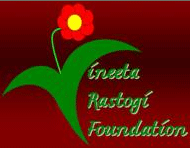
|

|
|
Vineeta Rastogi Harvard School of Public Health Commencement Speech, June 1994
A Call for Tolerance Five years ago a Harvard Ph.D., Francis Fukuyama, working as the state department's prophet, predicted that the fall of the Berlin Wall and victory of liberal democracy would end ideology. The historic ebb and flow of national struggles would cease. The world had found its natural end place: free markets, free peoples, free speeches and freedoms. It was, he said, "The End of History." Fukuyama's musings spread from internal government memos to capture the world's imagination. It was a time of 'Global Villages,' 'Peace Dividends' and 'New World Orders.' Remember them? Never quite defined, these concepts gave a vision to a bleary world. We now see history, bereft of ideology, has begun to balkanize and cannibalize itself, as ancient tribes revert to ancient hatreds. Communism (or the fear of it) was clearly an effective suppressant of ethnic tensions. The 'New World Order' proved to be no order at all - it is anarchy born of the earliest and worst of human diseases - hatred. The 'Peace Dividend' shattered into a hundred regional wars. The 'Global Village' dispersed into a globe of tribal villages seething with intolerance. Ethnic jealously and bigotry transcend even greed. Religious and ethnic tribes self congratulate into a collective narcism, defying logic. Girls are now shot in Algeria for not wearing the veil. American Christians kill doctors who perform abortions. To ethnically cleanse, Christian Serbs rape Muslim women. And, at the holy city of Ayodhya, my tribe, the Hindus, chanted about a one thousand-year old history as they ripped apart a 600-year old mosque. As Jonathan Swift lamented, "We have just enough religion to make us hate but not enough to make us love one another." Why are we so proud of our religion or ethnicity? If I were Kashmiri could I be less proud of my culture? If I were of any other race or religion, would I not still hold my head high? "It is possible that our race is an accident, in a meaningless universe, living its brief life uncared for, on this dark, cooling star: but even so - and all the more - what marvelous creatures we are!" Clarence Day wrote. Zlata Filipovic, the 13-year old Bosnian girl who wrote in her diary: "horrors are unfolding instead of days," has been hailed as the 'Anne Frank of Sarajevo.' WHAT?? An Anne Frank of Sarajevo? Will there be an Anne Frank of Kigali, Juba, Belfast, Timor, Kashmir, or Luanda? We promised no more Anne Franks. Never again, never forget. Have we forgotten or are we mad? Were our countries perpetrating such genocides, we would protest. But we don't protest, we don't sing, we don't start hunger strikes. We do nothing. Could I have torn down that mosque? Could I have gripped the machete that cleaved open that Tutsi face? Could I have aimed my barrel on that unveiled Algerian girl? Well, I do. I do hold the machete, I do paralyze, kill and maim. We all do, every time we do nothing. As Edmund Burke warned, "The only thing necessary for the triumph of evil is for good men to do nothing." We should, can, and will stop the hatred. But how? A comedian, after despondently recounting the world's problems, said, "But what can I do? . . . I'm not a folk singer!" As Public Health professionals, we see one of the greatest challenges as the cause and cure of cancer. This quest became more important for me when, last fall, I was diagnosed with this illness. With no notice my life was confined to antiseptic hospital rooms, tied to chemotherapy lines. On my journey to a miraculous recovery, I lay in weakened state asking the question, "Why? Why me . . . why me? But how much worse this would have been had I known the reason for my pain was simply my color, my religion, my race or my tribe?- characteristics a part of me, yet not really me at all. The broken, the injured, the grieving, and the displaced do not ask "Why me?". They know Compared to the bigots, drunken with hate, who reside in the hills of Sarajevo, the jungles of Rwanda, the swamps of Sudan, or sidewalks of abortion clinics, cancer seems almost benign. Sectarianism is the worst disease we face. Rwanda saw half a million hacked to death in less than a month. No disease is that cruel, that uncaring, that unremitting. Even doctors and nurses, who are not killed by the hatred must flee from it. Our work, public health, becomes irrelevant when hate-filled strife becomes the norm. Finding the cure for hatred is in all our enlightened self-interests. To paraphrase the holocaust refrain: when they killed the Tutsi, I said nothing. When they killed the Bosnian, I did nothing. When they killed the Dinka I did not protest. When they killed the Kashmiri I looked away. When they come to kill us, will there be anyone left to answer my cry? Luckily, unlike so many of the diseases we are fighting, a cure for strife exists. It is called education. As Willa Cather told us, "there is no such thing as creative hate." Education and creativity dissolve intolerance. The Harvard School of Public Health has endowed us with these tools. We leave Harvard with a great deal of debt - not just financial! We also have a debt to this institution and society to apply the tools of our trade. The world will respect those who have passed through the doors of this ivory tower and challenged the world's killing fields, no matter it be in Roxbury or Rwanda. Let us envision our Harvard diplomas as not just decorated accolades of our academic achievements, but rather a beacon to our commitment to social change. So, let us start writing our history, not ending it.
|